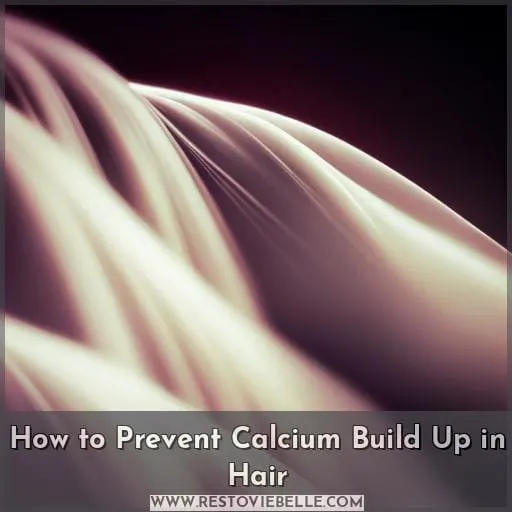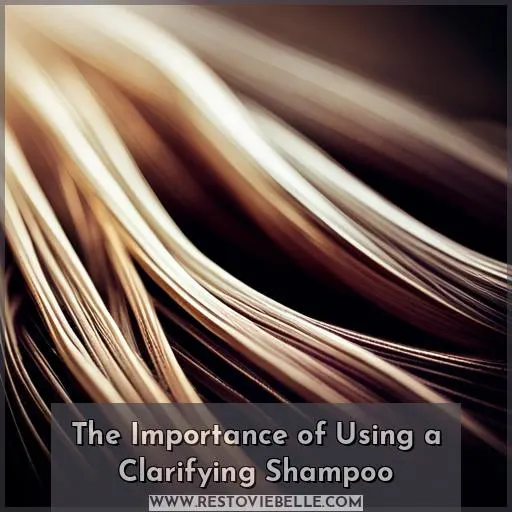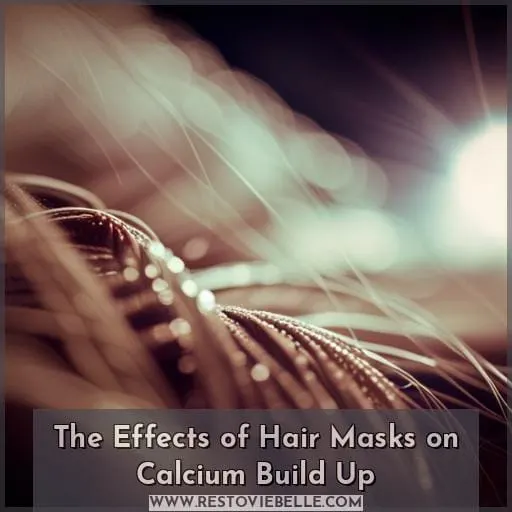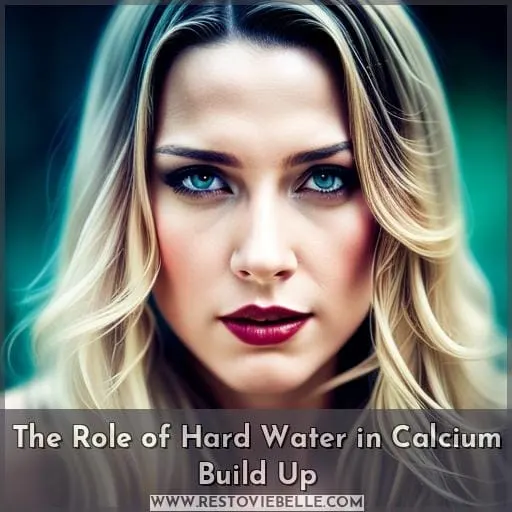This site is supported by our readers. We may earn a commission, at no cost to you, if you purchase through links.
 Imagine having to deal with dry, brittle hair that just won’t seem to retain moisture. The culprit? Calcium build up in your hair caused by hard water. But don’t worry, there are ways you can prevent this pesky problem and keep your locks looking healthy and hydrated.
Imagine having to deal with dry, brittle hair that just won’t seem to retain moisture. The culprit? Calcium build up in your hair caused by hard water. But don’t worry, there are ways you can prevent this pesky problem and keep your locks looking healthy and hydrated.
In this article, we’ll share some expert tips and tricks on how to combat calcium build up in your hair so you can enjoy luscious locks once again.
Table Of Contents
- Key Takeaways
- The Effects of Calcium Build Up in Hair
- How to Prevent Calcium Build Up in Hair
- The Benefits of Using a Water Softener Shower Head
- The Importance of Using a Clarifying Shampoo
- The Effects of Hair Masks on Calcium Build Up
- The Power of Citrus and Vinegar for Hair
- The Role of Hard Water in Calcium Build Up
- How to Reverse the Effects of Calcium Build Up
- The Connection Between Calcium Build Up and Hair Loss
- The Importance of Proper Hair Care in Preventing Calcium Build Up
- Frequently Asked Questions (FAQs)
- What are the common symptoms of calcium build up in hair?
- Can calcium build up in hair lead to hair loss?
- How can a water softener shower head help in preventing calcium build up in hair?
- What is the role of a clarifying shampoo in preventing calcium build up in hair?
- How do hair masks affect calcium build up in hair?
- Conclusion
Key Takeaways
- Calcium buildup in hair can lead to dryness, dullness, breakage, and hair loss over time.
- Signs and symptoms of calcium buildup include dryness, dullness, increased breakage, brittleness, frizziness, and unwanted color changes.
- Prevention strategies for calcium buildup include using a water softener showerhead, incorporating a clarifying shampoo, applying a hair mask with beneficial ingredients, and trying a citrus and vinegar rinse.
- Using a water softener showerhead can remove minerals from water, prevent calcium buildup, reduce damage caused by hard water, maintain healthy hair, and extend the lifespan of other hair care products.
The Effects of Calcium Build Up in Hair
When calcium builds up in your hair, it can have several negative effects.
Hard water, which contains high levels of calcium and magnesium, can lead to:
- Dryness
- Dullness
- Breakage
- Even hair loss over time.
These minerals can also create a film on the scalp that restricts healthy hair growth.
Understanding the effects of calcium build up is crucial in order to prevent and address these issues effectively.
Hard Water and Its Impact on Hair
If you’re dealing with hard water, it’s important to understand its impact on your hair.
Hard water contains high levels of calcium and magnesium, which can lead to calcium build-up in your hair. This can cause various symptoms such as dryness, breakage, dullness, and frizziness.
To prevent these issues, consider using a water softener shower head or clarifying shampoo specifically designed for hard water. Additionally, rinsing your hair with filtered or bottled water can help mitigate the effects of calcium overload caused by hard water.
Signs of Calcium Build Up in Hair
You may notice signs of calcium build up in your hair, such as:
- Dryness
- Dullness
- Increased breakage
Calcium deposits can make your hair feel:
- Brittle
- Prone to tangles
Additionally, you might experience:
- Frizzyness
- A lack of moisture
Due to the buildup on your strands, calcium can also cause:
- Unwanted changes in color like brassiness or a green hue.
Furthermore, it can lead to scalp irritation with symptoms like:
- Dandruff or flaking.
In severe cases, calcium build up has been linked to hair loss, thinning, and even baldness.
How to Prevent Calcium Build Up in Hair
To prevent calcium build up in your hair, there are several effective strategies you can implement.
First, consider using a water softener shower head to remove the minerals that contribute to build up.
Additionally, incorporating a clarifying shampoo into your hair care routine will help remove any existing buildup.
Finally, applying a hair mask and rinsing with a citrus and vinegar rinse can further promote healthy scalp and prevent calcium accumulation.
Use a Water Softener Shower Head
Invest in a water softener shower head to effectively prevent calcium build up in your hair.
These shower heads are cost-effective and easy to install, providing long-term benefits for your hair health.
With proper maintenance and warranty coverage, you can enjoy the effectiveness of a water softener without worrying about calcium build up in your hair caused by hard water from your shower.
Use a Clarifying Shampoo
To prevent calcium build up in your hair, incorporate the use of a clarifying shampoo.
Clarifying shampoos are specially formulated to remove product buildup and mineral deposits from the hair.
Use them once a week or as needed to keep your strands clean and free from unwanted residue.
Look for the best clarifying shampoos available, including options at drugstores, to find one that suits your needs.
Remember to follow the instructions on how to use these shampoos properly and be aware of any potential side effects such as dryness or stripping of natural oils from the scalp.
Apply a Hair Mask
To effectively prevent calcium build up in your hair, it’s important to incorporate the use of a hair mask into your regular hair care routine.
Hair masks should be applied once or twice a week and left on for about 20-30 minutes before washing out.
Look for masks that contain ingredients like apple cider vinegar, aloe vera, natural shampoo, and essential oils for best results.
Try a Citrus and Vinegar Rinse
To prevent calcium build up in your hair, try incorporating a citrus and vinegar rinse into your hair care routine.
The benefits of this rinse include:
- Breaking down calcium deposits
- Balancing scalp pH levels
- Promoting healthier-looking hair
The Benefits of Using a Water Softener Shower Head
Using a water softener shower head can provide numerous benefits for your hair.
These specialized shower heads are designed to remove minerals, such as calcium and magnesium, from the water supply.
By reducing the mineral content in your shower water, a water softener shower head helps prevent scale buildup on your hair, leaving it softer and more manageable.
Additionally, using a water softener can help extend the lifespan of other hair care products by minimizing their interaction with hard minerals in the water.
Removing Minerals From Water
If you want to effectively remove minerals from your water and prevent calcium build up in your hair, a water softener shower head is the perfect solution for you. These innovative shower heads are designed to filter out harmful minerals such as calcium and magnesium, which are commonly found in hard water. By using a water softener shower head, you can enjoy clean and purified water that’s gentle on your hair and prevents the formation of unsightly calcium deposits. Say goodbye to dull, damaged hair caused by hard water with this simple yet effective solution.
Benefits of Using a Water Softener Shower Head
| Benefit | Explanation |
|---|---|
| Removes Minerals From Water | A water softener shower head removes unwanted minerals from the water before it comes into contact with your hair. |
| Prevents Calcium Build Up | Hard water can cause calcium build up in your hair, which can lead to dull, damaged hair. A water softener shower head prevents this build up by removing the calcium from the water. |
| Reduces Damage Caused by Hard Water | Hard water can damage your hair by stripping it of its natural oils. A water softener shower head helps to reduce this damage by softening the water. |
| Maintains Healthy Hair | A water softener shower head helps to maintain healthy hair by removing minerals and preventing damage. |
Hardwater contains high levels of dissolved minerals like calcium (Ca2+) and magnesium (Mg2+). When these elements react with soap or shampoo during washing, the result is precipitation — better known as soap scum.
A residue left behind on skin after bathing gives bacteria something more substantial than our natural oils upon which they can grow; likewise, persistent exposure may lead to drier scalps accompanied by itchiness due dryness induced through osmosis processes transforming healthy moisture into less equilibrium state between cells causing dehydration symptoms – tightness when touched too often.
Reducing Scale Buildup on Hair
Reduce scale buildup on your hair by using a water softener shower head.
Hard water, which contains high levels of calcium and magnesium, can lead to scale buildup and damage to your hair. This can result in issues such as dryness, dullness, breakage, and even hair loss.
By installing a water softener shower head that removes these minerals from the water before it touches your hair, you can prevent scale buildup and promote healthier-looking locks.
Take control of your hair care routine with this simple solution for reducing hard water’s effects on your precious strands!
The Importance of Using a Clarifying Shampoo
Using a clarifying shampoo is essential for preventing calcium build up in your hair.
Clarifying shampoos are specially formulated to remove product buildup and dissolve calcium deposits, restoring the health and vitality of your hair.
By incorporating a clarifying shampoo into your hair care routine, you can effectively eliminate any residue or impurities that may be weighing down your locks and hindering their natural shine and bounce.
Removing Product Buildup
Clearing away product buildup is essential for maintaining healthy hair.
Product buildup can weigh down the hair, make it look dull and lifeless, and even lead to scalp issues such as itching or flaking.
To effectively remove product buildup, it’s important to use a clarifying shampoo that’s sulfate-free and gentle on the hair.
These shampoos are specifically formulated to deeply cleanse the hair without stripping away its natural oils.
Additionally, incorporating regular deep conditioning treatments and using an apple cider vinegar rinse can further help in removing residue from styling products while nourishing the strands.
Dissolving Calcium Deposits
To dissolve calcium deposits and effectively remove buildup from your hair, use a clarifying shampoo.
Calcium deposits can accumulate on the scalp due to hard water or excessive calcium in the body. These deposits can restrict healthy hair growth and lead to issues like poor follicle function, thinning hair, and breakage.
A clarifying shampoo contains ingredients like baking soda, vinegar, lemon juice, apple cider vinegar that help break down these calcium deposits and restore your hair’s natural balance.
The Effects of Hair Masks on Calcium Build Up
Hair masks can be a valuable tool in preventing calcium build up in hair.
Deep conditioning and hydration are key factors when it comes to maintaining the health of your hair, and hair masks provide an intense dose of moisture that helps restore the natural pH balance.
By regularly incorporating hair masks into your routine, you can strengthen your strands, improve manageability, and reduce the likelihood of calcium deposits forming on your scalp or in your hair follicles.
Deep Conditioning and Hydration
To further combat the effects of calcium build up in your hair, one effective method is to incorporate hair masks into your routine for deep conditioning and hydration.
Deep conditioning helps to restore moisture and nourishment to your hair, preventing dryness and brittleness caused by calcium overload. Look for ingredients like argan oil, shea butter, or coconut oil in hair masks as they provide intense hydration.
Leave the mask on for at least 20 minutes before rinsing it out thoroughly. The frequency of deep conditioning depends on your specific needs but aim for once a week to keep your hair healthy and hydrated.
Restoring Hair’s Natural PH Balance
To restore your hair’s natural pH balance and combat calcium build up, try using a hair mask.
Hair masks are a great way to nourish and hydrate your hair while also balancing its pH levels.
When the pH balance of your scalp is disrupted due to calcium buildup, it can lead to issues like dryness, dullness, and even hair loss.
By incorporating a regular hair mask into your routine, you can replenish moisture and essential nutrients while restoring the optimal pH balance for healthy-looking locks.
The Power of Citrus and Vinegar for Hair
Did you know that citrus and vinegar can be powerful allies in preventing calcium build-up in your hair?
Citrus fruits, such as lemons and oranges, contain natural acids that can break down calcium deposits on the scalp.
Vinegar, particularly apple cider vinegar, helps to balance the pH levels of the scalp and prevent excessive calcium accumulation.
By incorporating citrus rinses or vinegar treatments into your hair care routine, you can effectively combat calcium build-up and maintain healthy hair.
Breaking Down Calcium Deposits
Use a simple and effective way to break down calcium deposits in your hair by incorporating citrus and vinegar rinses into your hair care routine.
The acidity of lemon juice and apple cider vinegar helps dissolve the calcium buildup, restoring the health of your scalp and promoting hair growth.
You can create a homemade rinse by mixing equal parts lemon juice or apple cider vinegar with water, then applying it to your hair after shampooing.
This natural remedy, along with regular use of clarifying shampoos, will help you combat calcium buildup in your strands.
Balancing Scalp PH Levels
To maintain balanced scalp pH levels and combat calcium buildup in your hair, incorporate the power of citrus and vinegar into your hair care routine.
Citrus fruits like lemons and oranges are rich in citric acid, which helps to balance the pH of your scalp.
Vinegar, specifically apple cider vinegar, is known for its acidic properties that can restore optimal pH levels on the scalp.
Here are three tips for balancing scalp pH:
- Rinse your hair with a mixture of water and lemon juice.
- Use diluted apple cider vinegar as a final rinse after shampooing.
- Incorporate citrus-infused products or shampoos with natural acids into your routine.
The Role of Hard Water in Calcium Build Up
Did you know that hard water contains high levels of calcium and magnesium? These minerals can create soap scum and restrict healthy hair growth.
- Breakage
- Thinning
- Dryness
- Dullness
- Frizzyness
- Even color changes.
Understanding the role of hard water in calcium build up is crucial for preventing further damage to your precious locks.
High Levels of Calcium and Magnesium
Hard water plays a significant role in the buildup of calcium and magnesium on your hair, leading to damage and other undesirable effects.
When hard water comes into contact with your scalp, it can cause calcium deposits to form, resulting in an overload of calcium that can lead to hair loss and damage.
The minerals in hard water also make it difficult for your hair to retain moisture, leaving it dry and prone to breakage.
To prevent this buildup and protect your hair from these harmful effects, incorporating proper hair care techniques is essential.
Soap Scum and Hair Damage
Soap scum left behind by hard water can wreak havoc on your hair, causing damage and leading to calcium build up.
When you shower with hard water, the minerals in it combine with the natural oils on your scalp and hair, creating a sticky residue that coats each strand.
This buildup not only makes your hair dull and lifeless but also prevents moisture from penetrating the shafts, resulting in dryness and breakage.
To prevent this damage, invest in showerhead solutions that remove minerals from the water or use clarifying shampoos to get rid of product residue effectively while maintaining your scalp’s natural pH balance.
How to Reverse the Effects of Calcium Build Up
To reverse the effects of calcium build up in your hair, one effective method is to use filtered water for rinsing.
Filtered water helps to remove the excess minerals that contribute to calcium build up, leaving your hair healthier and more manageable.
By incorporating this simple step into your hair care routine, you can help restore vitality and prevent further damage caused by calcium overload.
Using Filtered Water for Rinsing
Rinse your hair with filtered water to effectively reverse the effects of calcium build up.
Filtered rinsing is an essential step in maintaining optimal water quality for healthy hair and scalp care. By using filtered water, you can prevent the harmful minerals found in hard water from depositing on your hair shaft and causing damage.
Hard water contains high levels of calcium and magnesium, which can lead to dryness, breakage, dullness, and frizziness. Additionally, these mineral deposits can restrict healthy hair growth over time.
Filtering your rinse water removes these minerals from the equation and helps restore balance to your strands. It allows for better moisture retention in the hair as well as a reduction in product buildup that occurs due to calcium overload.
To ensure proper preventive measures against calcium build up on your scalp and promote overall hair health,
make sure you incorporate regular filtered rinses into your routine.
The Connection Between Calcium Build Up and Hair Loss
Did you know that calcium build up in your hair can lead to poor follicle function, thinning hair, and breakage?
When excess calcium accumulates on the scalp and in the bloodstream, it can restrict healthy hair growth and cause harm to the follicles.
Understanding this connection between calcium build up and hair loss is crucial for preventing further damage and maintaining a healthy head of hair.
Poor Follicle Function
To prevent calcium build up in your hair and avoid the potential for hair loss, it’s important to maintain healthy follicle function.
Poor follicle function can be a result of calcium overload in the scalp, which can negatively impact hair growth.
To ensure optimal follicle health and promote healthy hair growth, consider these preventive measures:
- Maintain a balanced scalp by using shampoos formulated to remove calcium deposits.
- Incorporate leave-in formulas fortified with magnesium to help balance skin and scalp.
- Use filtered water for rinsing your hair to reduce the amount of calcium buildup on your scalp.
- Support overall scalp health by eating foods high in magnesium that can help prevent excessive absorption of calcium into the body.
[ADDITIONAL NOTES]:
Remember that poor follicle function due to excessive calcium buildup can contribute to thinning hair and even lead to eventual Hair Loss if left untreated or unaddressed properly over time.
[FUTURE SUBTOPIC]:
The Role of Scalp Balance in Preventing Calcium Build Up
Thinning Hair and Breakage
As calcium builds up in the hair, it can lead to thinning and breakage due to its detrimental effects on follicle function.
When there’s an excess of calcium in the scalp, it can interfere with healthy hair growth and weaken the strands, making them more prone to breakage.
To prevent this from happening, focus on preventing breakage by:
- Nourishing your hair with proper nutrition,
- Using gentle styling techniques that minimize damage,
- Taking care of your scalp health through regular cleansing and exfoliation, and
- Promoting optimal hair growth through a balanced diet and lifestyle choices.
The Importance of Proper Hair Care in Preventing Calcium Build Up
To prevent calcium build up in your hair, it’s important to prioritize proper hair care.
Start by using sulfate-free shampoos specifically designed for hard water, as they can help remove mineral deposits from your strands.
Additionally, make sure to rinse your hair in the direction of natural growth and end showers with cold water, as these practices can further minimize calcium accumulation.
By taking these steps and maintaining a consistent hair care routine, you can effectively prevent calcium build up and keep your locks healthy and vibrant.
Sulfate-Free Shampoos for Hard Water
To properly care for your hair and prevent calcium build up, it’s important to choose sulfate-free shampoos specifically designed for hard water.
When selecting a shampoo, look for ones that are gentle yet effective in removing mineral deposits from your hair.
Consider using water softeners or installing a filtered showerhead to minimize the effects of hard water on your hair.
Additionally, incorporating regular hair masking treatments and citrus rinses can help maintain healthy-looking locks.
Don’t forget about preventive nutrition by consuming foods rich in nutrients that support strong and vibrant hair.
Rinsing Hair in the Direction of Natural Growth
When it comes to preventing calcium build up in your hair, a simple yet effective practice is rinsing your hair in the direction of its natural growth. This helps to ensure that any residue or buildup from hard water doesn’t get trapped in the follicles and scalp.
In addition, incorporating brushing techniques, scalp massages, hair oiling, using silk pillowcases, and adjusting shower temperature can also contribute to maintaining healthy and calcium-free hair.
Ending Showers With Cold Wate
End your showers with cold water to help prevent calcium build up in your hair.
Cold water has numerous benefits for hair resilience and scalp stimulation.
The thermal shock therapy from cold water can improve blood circulation, leading to healthier follicles and stronger hair growth.
It also helps seal the cuticles, preventing moisture loss and reducing frizz.
Incorporate this simple step into your routine for healthy, vibrant locks.
Frequently Asked Questions (FAQs)
What are the common symptoms of calcium build up in hair?
Are you experiencing hair that feels dry, brittle, and lacks shine? Do you notice your hair becoming dull or difficult to manage? These are common symptoms of calcium build up in the hair.
Can calcium build up in hair lead to hair loss?
Yes, calcium build up in hair can lead to hair loss.
Like a suffocating vine choking the life out of a plant, excessive calcium deposits on the scalp can hinder healthy follicle function, resulting in thinning and shedding.
How can a water softener shower head help in preventing calcium build up in hair?
A water softener shower head can prevent calcium build up in your hair by filtering out the minerals that cause it. This helps maintain the health and strength of your hair, preventing damage and potential hair loss.
Experience softer, healthier locks with a water softener shower head.
What is the role of a clarifying shampoo in preventing calcium build up in hair?
A clarifying shampoo plays a crucial role in preventing calcium build up in your hair. Its deep cleansing formula removes residue and buildup, including minerals like calcium, leaving your hair refreshed and free from the damaging effects of hard water.
How do hair masks affect calcium build up in hair?
Hair masks can help to prevent calcium build up in hair by providing deep hydration and nourishment. This promotes healthy hair growth and reduces the likelihood of mineral deposits forming on the scalp.
Conclusion
To prevent calcium build up in your hair and restore its health and hydration, try incorporating some expert tips and tricks into your hair care routine.
Start by using a water softener shower head to remove mineral deposits, followed by a clarifying shampoo to dissolve buildup.
Applying a hair mask and trying a citrus and vinegar rinse can also help restore moisture and balance to your locks.
















